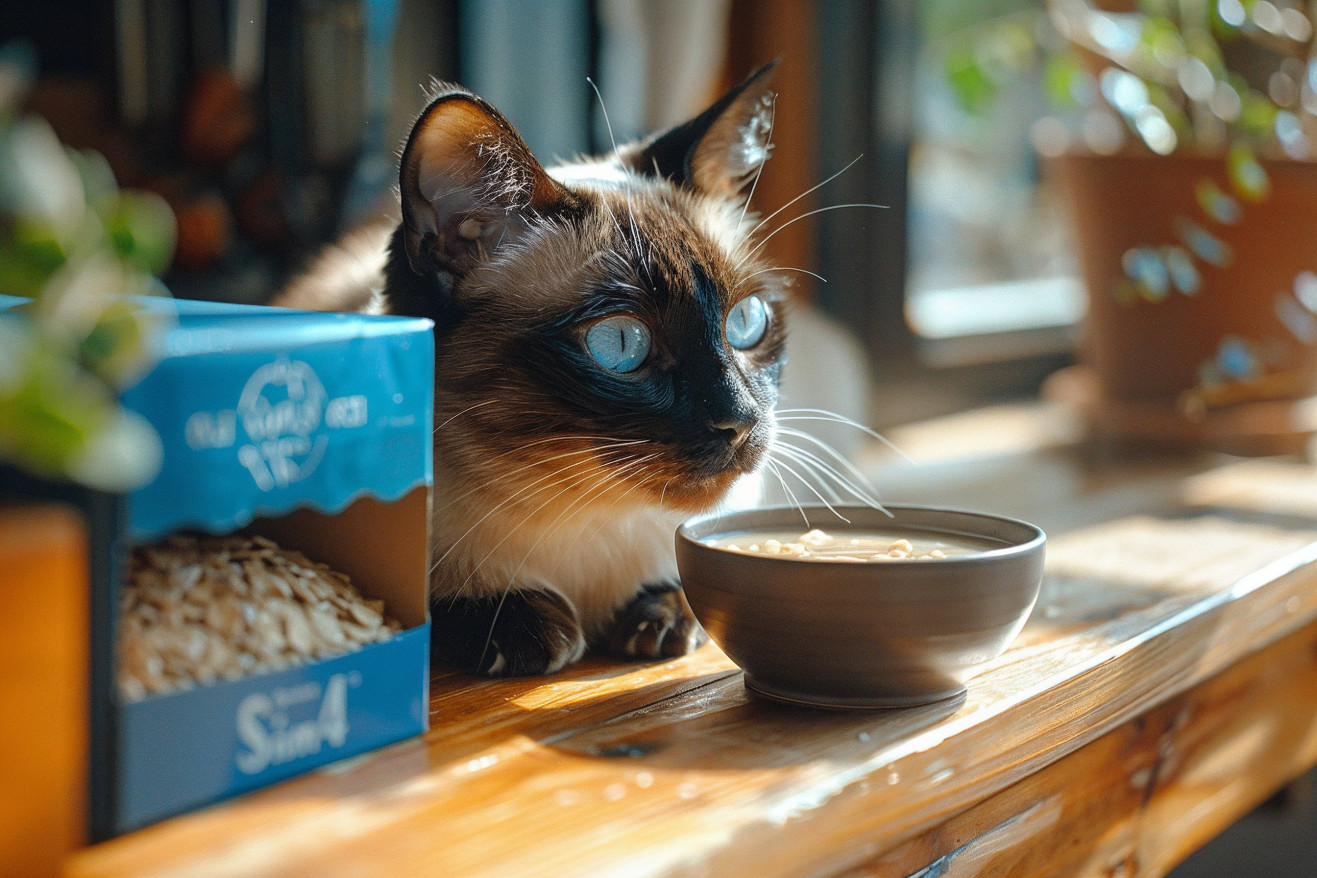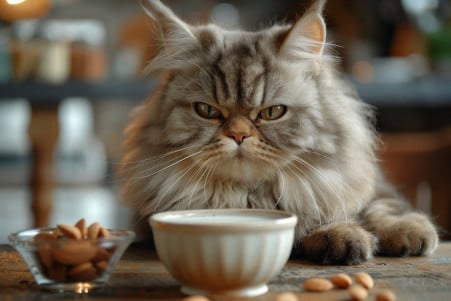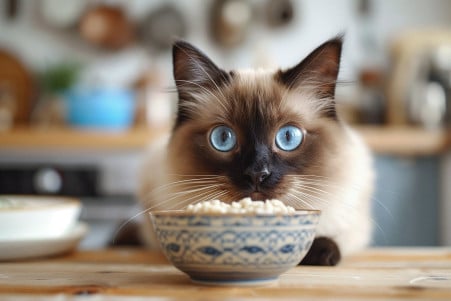Can Cats Drink Oat Milk? What to Know About Feline Nutrition
23 February 2024 • Updated 21 February 2024

Oat milk is one of the latest popular plant-based milk options, but is it OK for cats to drink? Cats can have oat milk in moderation as an occasional treat. However, oat milk isn’t good for cats because it doesn’t have any nutritional value and may include ingredients that can upset your cat’s stomach. Make sure that the oat milk doesn’t have any dangerous sweeteners like xylitol.
This article will review a number of nutritional analyses and insights from veterinarians to discuss the effects of plant-based milk on cats. These results will reference animal nutritionists and the most recent veterinary science to provide a thorough understanding of how non-dairy milk options, including oat milk, fit into a cat’s diet. The aim is to give you the information you need to make the best choices for your cat’s nutritional needs.
Can cats drink oat milk?
Should You Feed Your Cat Oat Milk: Nutritional Needs vs. Plant-Based Options
VCA Animal Hospitals explains that cats are obligate carnivores, meaning they need a diet that consists mostly of meat to fulfill their nutritional requirements. Cats need a lot of protein in their diet and they need to consume certain amino acids, including taurine, which is only found in animal tissue.
On the other hand, the Purina Institute explains that oat milk, a plant-based milk made for human consumption, is high in fiber, B vitamins, and minerals, but it doesn’t contain the essential animal-based nutrients cats need.
According to the nutritional information provided by Verywell Fit, oat milk contains 16g of carbs and only 3g of protein per cup, which is the opposite of the high-protein, low-carb diet that’s best for cats.
While the vitamins and minerals added to oat milk may make it look like a good option, they don’t make up for the lack of essential amino acids and the high carbohydrate content that can be hard for cats to digest.
Because of this, most experts advise against using any type of non-dairy milk, including oat milk, as a cat supplement due to the lack of nutrients and potential digestive issues.
Potential Effects of Oat Milk on Cats
Oat milk is generally safe for cats to consume in small amounts, but there are a few things to consider in terms of your cat’s health.
For example, some store-bought oat milk brands may contain preservatives, salt, and flavorings, all of which can be harmful to cats.
In addition, oat milk has a high carbohydrate content—about 16 grams per cup—which is a significant departure from the low-carb, high-protein diet that cats are used to.
While oat milk does contain some nutrients, including potassium, iron, calcium, and vitamins A and D, it doesn’t contain the animal-based proteins that cats need in their diets. As a result, Dr. Sara Ochoa, DVM, told Cat-World.com that cats shouldn’t consume oat milk regularly because it can cause long-term digestive issues and doesn’t provide any real health benefits.
Veterinarians recommend that oat milk can be given to cats as an occasional treat, but it should be given in moderation and should never replace a cat’s water consumption. It’s also important to make sure that the oat milk you give your cat doesn’t contain any harmful additives and to watch your cat for any negative side effects after they consume it.
Doing so is important for ensuring that your cat stays healthy and that their diet continues to meet their nutritional needs.
Finding the Best Milk Alternative for Cats
Most adult cats are lactose intolerant, a condition that results from a lack of the enzyme lactase, which is needed to break down lactose, the sugar in milk. As Petplan explains, as kittens mature, they naturally start to produce less lactase, which means they have a harder time breaking down lactose, and cow’s milk is no longer a good option. This can lead to digestive issues, including diarrhea and stomach upset.
Because of this intolerance, it may seem like lactose-free options such as oat milk would be a good alternative. While oat milk doesn’t have lactose, it’s important to look at the nutritional content and the ingredients in oat milk before giving it to your cat.
Zoetis Petcare suggests that if you want to give your cat milk, you should look for lactose-free milk that’s specifically made for cats, which you can often find in pet stores, because it’s formulated to meet their nutritional and taste needs.
Dr. Sam Gilbert of Zoetis Petcare also suggests that you can give cats small amounts of cultured dairy products, such as plain yogurt, as a milk alternative.
These products have less lactose because the fermentation process breaks it down, which makes them easier for cats to digest.
However, it’s important to remember that you should always give your cat new treats in moderation to avoid any health issues.
Mindful Ways to Integrate Oat Milk into Your Cat’s Diet
If you decide to give your cat oat milk, start with a very small amount to see how they react. Dr. Sara Ochoa, DVM, suggests giving no more than a quarter cup of oat milk at a time and only as a treat, adding that it should not be a regular part of their diet.
Make sure to check the label before giving it to your cat to make sure it doesn’t contain any added sugars, salt, or sweeteners like xylitol, which can be toxic to cats.
Keep an eye on your cat for signs of digestive issues, like diarrhea, gas, or an upset stomach, especially in the first 12 hours after they drink the oat milk, as these can be signs of an intolerance. Catster also points out that even though oat milk is lactose-free, the high carbohydrate content can lead to these issues.
Remember that balance is important when it comes to your cat’s diet. Treats like oat milk should only be a small part of their diet, with the majority of their nutrition coming from a high-quality, meat-based cat food. This will help ensure that your cat’s natural dietary needs are being met and that they’ll be healthy and happy for years to come.
Investigating the Impact of Plant-Based Milks on Feline Health
The controversy of plant-based diets for obligate carnivores like cats is still being investigated. Cats need nutrients that are only found in animal products, which are not found in plant-based milks like oat milk. A paper in the Journal of Animal Science and Biotechnology notes the importance of high-quality protein and essential amino acids, including taurine and arginine, which are essential for cats’ health and metabolism and are not found in plant-based sources.
A paper by Sarah A. S. Dodd in BMC Veterinary Research looked at the health outcomes of cats fed meat-based (MB) and plant-based (PB) diets and found that there was no significant difference in the lifespan of the two groups, but that the cats fed a PB diet had fewer health problems.
This indicates that while plant-based diets may not shorten the lives of cats, there is a risk of nutritional deficiencies that could impact overall health.
A review in PMC notes that pet owners often choose to feed their cats plant-based diets because of ethical or environmental concerns. However, it also notes that the long-term health effects of these diets are unknown and that they need to be carefully formulated and monitored, especially in cats, who are obligate carnivores.
Despite these studies and others, veterinary professionals still warn that cats need animal-derived nutrients and recommend against feeding plant-based milk to cats on a regular basis. As we learn more about feline nutrition, it’s important to remember the importance of meeting cats’ natural dietary needs.
Final Thoughts on Cat Nutrition and Oat Milk
So, in summary, oat milk is OK for cats to have in small amounts, but it doesn’t offer much in the way of nutrition. This is one reason to be wary of the milk alternative, especially since it often contains other ingredients that can be harmful to your cat. As Cat-World warns, you need to be careful to make sure that oat milk doesn’t contain any xylitol, which is toxic to cats.
Of course, the most important thing to remember is that cats need a balanced diet. Since cats are obligate carnivores, they need a diet that’s high in animal-based proteins. This is especially important when it comes to essential amino acids like taurine, which cats need to get from their food and can’t get from plant-based products like oat milk.
Studies of taurine have shown how important it is to make sure that cats’ diets meet their specific needs.
That’s why it’s important for pet owners to make sure that they’re making informed and thoughtful decisions about their pets’ diets. In particular, cat owners should talk to their vets to make sure that they’re getting advice that takes their cats’ unique nutritional needs into account.
And, of course, it’s important to remember that while the occasional treat like oat milk is OK, it should be just that—an occasional treat—and never a replacement for a diet that meets all of your cat’s nutritional needs.


